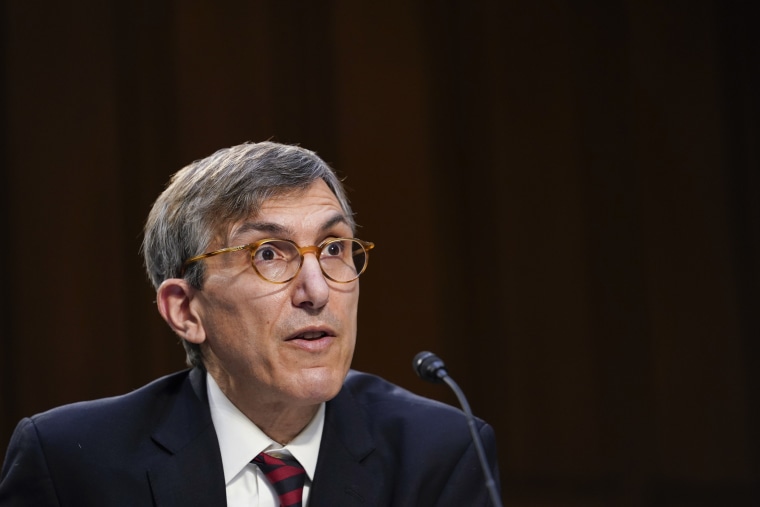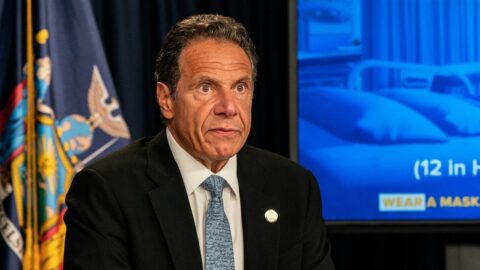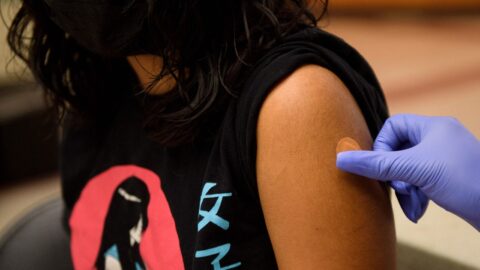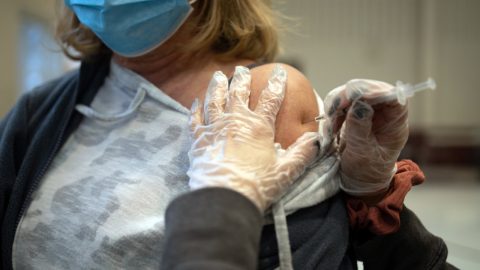Health Secretary Robert F. Kennedy Jr.’s “tepid endorsement” of measles vaccination puts the U.S. at risk of losing its elimination status of the disease as early as January, the Food and Drug Administration’s former top vaccine regulator said Tuesday — as experts warn the Texas outbreak may become among the biggest on record.
“Given the current measles outbreak, anything less than a wholehearted full-court press to get many more children vaccinated against measles, above 90% across the country, is a public health failure,” Dr. Peter Marks, the former director of the FDA’s Center for Biologics Evaluation and Research, who was ousted last month, told NBC News in an interview.
At a press briefing Tuesday, Texas health officials said the state’s outbreak had spread to 22 counties and continues to spread in Lubbock, where cases had jumped from 10 to 36. As of Tuesday, the number of measles cases in the state reached 505, up from 481 cases Friday. About 70% of the cases are children, said Katherine Wells, Lubbock’s director of public health. Six or seven kids at a day care in Lubbock have tested positive for measles, she added.
At least 57 people have been hospitalized in the area. On Saturday, a school-age girl being treated for measles-related complications died in Lubbock, becoming the second pediatric death in the fast-growing outbreak. Both children were unvaccinated.
More than 650 cases of measles have been reported in 21 states and the District of Columbia this year, more than double the number of U.S. cases in all of 2024, according to an NBC News tally.
On Sunday, Kennedy, who went to Texas to visit with the family of the child who died, posted on X that growth rates for new cases and hospitalizations had flattened.
However, the case count is likely an underestimate, experts say, since many people are likely not getting tested and illnesses are going undetected.
During the Tuesday press call, Dr. Amesh Adalja, an infectious disease physician senior scholar at Johns Hopkins Center for Health Security, said, “If you already have two deaths in Texas, it tells you it’s in the thousands.”
“I suspect this is probably one of the biggest on record,” Adalja said.
Wells said on the call, “We’re in this for the long haul.”
“We’re constantly adding more counties that have been exposed to Texas; we’re seeing this grow outside of Texas and other states,” Wells said.
A ‘blow to our achievements’
Marks said Kennedy needs to push parents to get their children vaccinated more than ever, which he says Kennedy isn’t doing.
In a post on X, Kennedy wrote, “The most effective way to prevent the spread of measles is the MMR vaccine.”
Kennedy did not, however, encourage people to get vaccinated. He also pushed remedies, including a steroid called budesonide, an antibiotic called clarithromycin and cod liver oil, a supplement high in vitamin A. None are proven treatments for the measles, experts say. High doses of vitamin A can cause nausea, vomiting and liver damage, especially in small children.
“He comes out with the most tepid endorsement of vaccination he possibly could,” Marks said.
Gaines County, the epicenter of the outbreak, has one of the state’s highest vaccine exemption rates, at nearly 18%, compared to 3% nationally, according to state data.

If more children don’t get vaccinated, more of them will die, Marks said, and the U.S. will lose the measles elimination status it’s held since 2000.
A country loses its status once an outbreak extends longer 12 months, he said. The Texas Department of State Health Services issued its first alert on measles in January. Adalja, of Johns Hopkins, said the outbreak is going to be “really something that pushes us to the deadline for elimination for the United States, as well as the Americas.”
“I think we’re well on our way,” said Marks, referring to the nation’s measles status.
An official at the Department of Health and Human Services said Mark’s suggestion that the administration’s endorsement of vaccination has been “tepid” is inaccurate.
“Contrary to Dr. Mark’s claims, the department has been aggressively working to address the current outbreak, increase vaccination rates, and provide support to states in need,” the official said.
Losing elimination status doesn’t actually carry any legal force, according to Dorit Reiss, a vaccine policy expert at the University of California, San Francisco.
“It’s a blow to our achievements,” Reiss said. “Measles still comes into our country and always has from people from abroad, but we don’t have domestic grown outbreaks. Losing the status means that’s no longer true.”
Without it, Marks said, people may find they need to prove their immunization status before traveling outside the U.S.
“Although that is trivial, it underlies the importance of getting this outbreak under control and protecting our children,” Marks said.
Two doses of the MMR vaccine are 97% effective in preventing infection.
Dr. Buddy Creech, a pediatric infectious disease physician at Vanderbilt University Medical Center in Nashville, said communities with low vaccination rates have been previously spared from outbreaks, as the U.S. hasn’t experienced the same level of measles activity seen 50 or 60 years ago, thanks to the MMR vaccine.
However, with the disease starting to spread again in the U.S., people may need to reconsider the risks of not getting vaccinated.
“I think that’s where people are challenged right now,” Creech said. “People haven’t thought about measles for maybe a generation or two, and they made a calculus about vaccines because they heard or read something.”
Measles is dangerous, Reiss said — a fact that should be repeatedly acknowledged by government health officials.
“We need a clear message from our leaders that people should get vaccinated,” she said.









Recent Comments